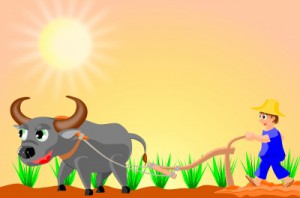I recently received the following question about unemployment from a gentleman in Tanzania and I thought it was a good question and I would share the answer with you.
What Causes Unemployment?
I have been thinking on that situation of unemployment. Why does the rate of unemployment increase day after day? Does it mean that people have decreased the rate of thinking on creating jobs or there is any other reason? ~ Lioba from Dar-es-Salaam Tanzania.
 Here is my Response:
Here is my Response:
Lioba, That is a very good question. Unemployment is a function of how efficient the marketplace is. In a purely agricultural economy, there is no unemployment, everyone has to work, if they don’t work they don’t eat. So everyone including children work. But as systems become more complex there is more opportunity for “friction” or market inefficiencies. Theoretically, an efficient market would support every person who could produce more than he cost. In other words, if someone could be paid $10 but produced $12 worth of goods, any business would be happy to hire them. On the other hand, if the government sets a minimum wage of $12 the market is no longer efficient and anyone who cannot produce at least $14 worth of goods would not be hired. Therefore after an increase in the minimum wage, those producing $10, $11 and $12 worth of goods would now be uneconomical for the employer so they would be fired.
So the first cause of unemployment is minimum wage laws.
But there are other inefficiencies as well. If the government imposes taxes, that raises the cost of doing business and marginal businesses that were barely profitable under the old system will go out of business, or fire some employees. If the government over-regulates businesses they will be less efficient and not be able to afford as many employees.
So the second cause of unemployment is government taxation and other inefficiencies.
And finally we have the effect of inflation. When governments print money, initially it tricks people into thinking they are richer than they really are, so they buy stuff they wouldn’t have purchased without the “stimulus”.
This increases the demand for “luxury” goods and creates extra jobs, which drives up overall wages (because there is more competition for labor) and for a while everyone feels richer. People are happy and politicians get re-elected.
But eventually everyone realizes that even though they have more dollars, each dollar doesn’t buy as much as it used to. And so they really aren’t any richer than they were before but… unfortunately they already spent the “extra” money. So now they have to cut back on expenses to make up for the money that they overspent.
They stop buy luxuries and even cut back on some of the necessities that they would normally have bought before the inflation.
Next, the luxury producers fire some workers and then the necessity manufacturers fire some workers… and since these workers have no income, they buy less. This puts more pressure on other businesses and this gets worse and worse until all the over spending that the inflation created is worked out of the system.
This can be done slowly by everyone “cutting back” and “living within their means” or quickly by defaulting on loans. But eventually the excess debt is wrung out of the system and people get their bills paid off and they start spending again. And so businesses start hiring again…
Unless the government intervenes and creates crazy laws to try to “help” (such as bailouts and preventing bankruptcy and defaults) this may slow the process of eliminating the debt and actually make the suffering last longer.
The basic law of economics is “there is no such thing as a free lunch” so if people overspend due to inflation, eventually they will have to underspend to make up for it.
So the third cause of unemployment is government money printing (inflation).
Before governments discovered the power of “economic stimulus” the cycles weren’t as bad but they still existed. In that case, society was primarily agricultural and the cycles were the result of natural weather cycles. “Bumper crops” were a form of natural inflation where everyone felt richer and then there were droughts which would reduce wealth in dry years and thus spending would “dry up” as well. The wise farmer would store up his wealth (rather than spend it) in the good years in preparation for the bad years.
Related Articles:
- Why Inflation is Theft
- Misery Index
- What is the Phillips Curve?
- Could a Raise in Minimum Wage Trigger Inflation?
 |
 |
 |
 |
| Economics in One Lesson: The Shortest and Surest Way to Understand Basic Economics | Human Action: A Treatise on Economics | The Theory of Money and Credit | America’s Great Depression |
Image courtesy of Bandrat / FreeDigitalPhotos.net


Leave a Reply